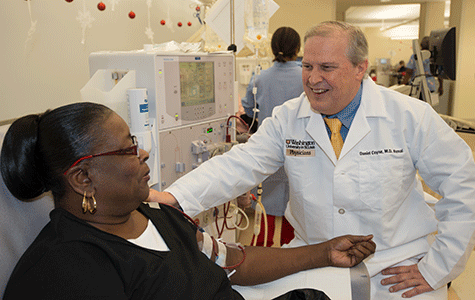
As a nephrologist, Daniel Coyne, MD, treats patients with kidney failure who rely on dialysis to stay alive. His patients typically spend several hours, three days a week, hooked up to dialysis machines that filter impurities and extra fluid from the blood.
The procedure can be exhausting, especially for those who are older – the average age of Coyne’s patients is 65. Many of them also suffer from chronic conditions like diabetes and hypertension and face great difficulties navigating the health-care system.
But Coyne considers caring for his patients a privilege. “We practice in an urban area, surrounded by people frequently neglected by our health-care system,” Coyne explained. “That’s one of the things that appealed to me about going into nephrology. In some ways, this can be a forgotten population, and it’s extremely gratifying to provide their care.”
Coyne directs dialysis at Washington University’s Chromalloy American Kidney Center on the Medical Campus and plays a role at two university-affiliated outpatient dialysis clinics. About 500 patients receive dialysis each week at the three locations.
But Coyne’s concern for dialysis patients extends far beyond the university’s clinics. He’s a strong believer in putting patients’ interests first, and that philosophy inspired him to lead the charge against widespread overuse of the anti-anemia drug Epogen in dialysis patients.
Coyne’s own investigation into the practice consumed more than eight years of his career and exposed the way close ties between pharmaceutical companies and physicians can put patients’ lives at risk.
“Dan took an early and principled stand against what proved to be the overuse of synthetic erythropoetin to treat the anemia of end-stage renal disease,” said Marc R. Hammerman, MD, the Chromalloy Professor of Renal Diseases and chief of the renal division in the Department of Medicine. “Others may have questioned the wisdom of using large doses of the drug but chose to remain on the sidelines. In contrast, Dan had both the scientific credentials and courage of his convictions to ensure that the right thing was done for patients.”
Most patients on dialysis develop chronic anemia because they can’t produce enough red blood cells, which carry oxygen from the lungs to the rest of the body. A severe shortage of red blood cells can be life-threatening, and for years the standard treatment was blood transfusions, but they, too, carry risks.
Then, in 1989, the U.S. Food and Drug Administration approved the drug Epogen to boost red blood cell production and prevent the need for blood transfusions in dialysis patients. Epogen went on to become one of the most lucrative drugs sold in the United States, yielding $2.5 billion annually in profits from its use in dialysis patients alone. But Coyne’s painstaking research has shown that the benefits of the drug were overblown and that potentially deadly side effects, including heart attacks and strokes, were missed.
“By 2004, I had become convinced that doctors were unnecessarily overtreating anemia and using far too much of the drug,” Coyne explained. “My research focused on highlighting the lack of data to support aggressive anemia treatment and the dangers of Epo.”
Coyne does not dispute that Epogen is a life-saving drug for patients with severe anemia. His concerns centered on high doses of the drug that were routinely given to treat mild or moderate anemia. Even today, most dialysis patients get some Epogen, “but you don’t need to give very much of the drug to prevent the need for transfusions,” he said.
As part of his research, Coyne uncovered misleading data on Epogen in a major study published in 1998 in The New England Journal of Medicine (NEJM). The study’s results raised concerns about the safety of the drug – showing a trend toward more deaths – but the statistical analysis in the journal did not tell the full story. Rather, the data led physicians to assume that the results did not reach statistical significance and that higher doses of the drug helped patients feel better.
In fact, while Epogen raised red blood cell counts and prevented the need for transfusions, it also increased the risk of heart attacks, blood clots and death. The drug also did not extend patients’ lives by keeping anemia in check, as had been hoped. But without a thorough statistical analysis, the dangerous side effects were missed because dialysis patients often die from heart problems, Coyne said.
After the study’s publication, use of the drug skyrocketed in patients with milder anemia, encouraged by marketing from Amgen, the drug’s maker. By 2005, Epogen was costing Medicare $2 billion a year, more than any other drug.
Physicians and dialysis clinics had financial incentives to prescribe high doses of Epogen, Coyne said, because they could mark up the cost of the drug, which was administered at the time of dialysis. The more they prescribed to patients, the more profits they made.
In his own practice at the School of Medicine, Coyne did not see benefits of prescribing high doses of Epogen. And information from the U.S. Department of Health and Human Services, which collects data on dialysis patients throughout the country, did not indicate a survival advantage.
“We looked at the survival data from year to year,” Coyne explained. “And the patients on dialysis, despite billions of dollars being spent on the drug, weren’t living any longer. So clearly, aggressive treatment for anemia was not benefiting most patients.”
Frustrated, Coyne filed a Freedom of Information Act request with the FDA in 2008 asking for the complete results of the earlier trial in NEJM. It took 3 ½ years before he received a response.
With the data eventually in hand, Coyne found significant discrepancies between the actual data and the published results in NEJM. He showed that the unadjusted results were statistically significant – there were more heart attacks and deaths among patients receiving the higher doses of Epogen – but that information had not been published. The full data also showed that higher doses of Epogen did not improve patients’ quality of life.
Two weeks before Coyne received the trial data, the FDA added new warnings to the package inserts for Epogen. Today, Coyne feels vindicated.
“The new labeling states that there are no risk-free doses of the drug, and maintaining patients at moderate anemia is better and certainly safer than giving them heavy doses of drugs that carry a lot of dangers like heart attacks and strokes,” he said.
Despite Epogen’s labeling change, Coyne has continued to analyze data on the drug and publish results. Writing in The Scientist in May 2012, Coyne noted, “Finally, as strange as it seems, I am now the sole author of the publication on the predefined primary and secondary results of the largest outcomes trial of [Epogen] in dialysis patients, and I didn’t even participate in the trial.”
Throughout the close look into Epogen, Coyne said he had the full backing of the university.
“The great strength of Washington University is that the administration allowed me to pursue this financially disadvantageous but patient-centered research, which exposed how pharma and dialysis companies were putting their own interests ahead of our patients,” he added.
Even as Coyne pursued his research into the risks of Epogen, he continued to provide exceptional care to his patients on dialysis. Today, much of their management is multidisciplinary, involving a team of doctors, a nurse practitioner, dietitians and social workers.
“We see all patients during their dialysis treatment at least once a week and deal with any acute issues they may have had,” he added. “Working together, my colleagues play a huge role in keeping patients happy and healthy.”
And Coyne continues to provide care that serves his patients’ best interests. “The story of pharmaceutical companies spinning research to sell drugs has occurred over and over again,” he said. “I do think there’s progress in making clinical trial data available to the public and to physician scientists, but we have a long way to go, and it’s still not clear to me that patient safety will be at the apex of the system.”
